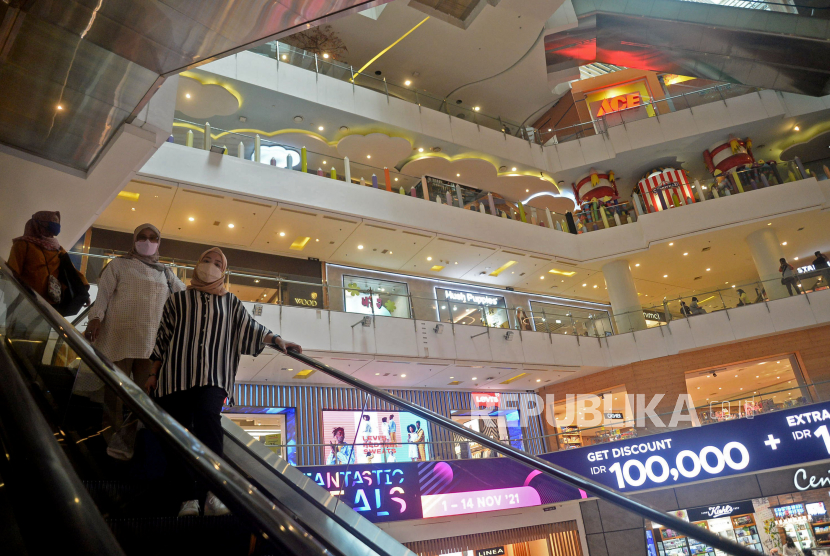The capacity of the mall is 100 percent opened and places of worship are a maximum of 75 percent.
REPUBLIKA.CO.ID, By Mimi Kartika, Dian Fath Risalah, Kiki Sakinah
All areas in DKI Jakarta and a number of regencies/cities have dropped to level 1 criteria for the Covid-19 pandemic situation. There is a relaxation of activities in the implementation of the Implementation of Community Activity Restrictions (PPKM) in areas that enter level 1, such as the capacity of malls being opened at 100 percent and places of worship a maximum of 75 percent.
This provision is contained in the Instruction of the Minister of Home Affairs (Inmendagri) Number 57 of 2021 concerning PPKM Level 3, Level 2, and Level 1 Covid-19 in the Java and Bali regions. This Inmendagri is valid for 2-15 November 2021.
In the sixth dictum of Inmendagri 57/2021 letter g, it is stated that activities at shopping centers/malls/trade centers in the PPKM level 1 area can be opened with a maximum capacity of 100 percent until 22.00 local time. This 100 percent capacity provision also applies to supermarkets or supermarkets that sell daily necessities. Meanwhile, restaurants, restaurants, or cafes located in buildings/shops or open areas located in shopping centers/malls are allowed to open with a maximum capacity of 75 percent.
Then, children under 12 years old are allowed to enter the mall provided that they are accompanied by their parents. Children’s playgrounds and entertainment venues in shopping centers/malls/trade centers are also opened on condition that parents must write down their address and telephone number for their needs. tracing.
In addition, cinemas can operate with a maximum capacity of 70 percent and only visitors in the green and yellow categories in the PeduliLindung application are allowed to enter. Children under 12 years old are allowed to enter provided that they are accompanied by a parent.
Restaurants/restaurants and cafes within the cinema area are permitted to accept meals on the premises (dine in) with a maximum capacity of 75 percent and a maximum feeding time of 60 minutes. Cinemas follow health protocols regulated by the Ministry of Tourism and Creative Economy and the Ministry of Health.
To enter the mall or any place inside the mall such as restaurants or cinemas, it is mandatory to use the PeduliLindung application to screen all visitors and employees.
Meanwhile, places of worship such as mosques, prayer rooms, churches, temples, monasteries, pagodas, and other places that function as places of worship can hold congregational worship or religious activities during the implementation period of PPKM level 1 with a maximum capacity of 75 percent. Places of worship must implement health protocols more strictly and pay attention to technical provisions from the Ministry of Religion.
In addition to DKI Jakarta, a number of other areas that meet the level 1 criteria include Tangerang City and Tangerang Regency, Banten; Bogor City, Pangandaran Regency, Banjar City, and Bekasi Regency, West Java; Tegal City, Semarang City, Magelang City, and Demak Regency, Central Java; and Surabaya City, Mojokerto City, Madiun City, Blitar City, and Pasuruan City, East Java.
Government arguments and facts on the ground
The Covid-19 Task Force revealed the reason why in implementing PPKM in areas that enter level 1, mall capacity was opened 100 percent and places of worship were only 75 percent maximum. The Head of Health Handling of the Covid-19 Task Force Alexander Ginting said that the maximum capacity was allowed at the mall because visitors were constantly moving and did not stay long in one place. Meanwhile, in places of worship, the movement tends to be more static.
“In the mall, they (visitors) mobile except when eating and there is a security (security officer) watching if there is a crowd. While worshiping, sitting still, static gathering, so there must be distance, there must be space among fellow congregations, “said Alexander.
In response to this, the General Chairperson of the DKI Jakarta Indonesian Ulema Council (MUI) KH Munahar Muchtar stated the facts on the ground regarding the implementation of congregational prayers in mosques in DKI Jakarta. According to him, the implementation of worship in the mosque is now safe. Not only that, he said, most mosques no longer apply social distancing rules in congregational prayer rows.
“Basically, DKI has all green zones and more than 130 percent of vaccines. That means, God willing, everything is safe. For the level 1 measure in Jakarta, it is considered that everything is safe, so for the implementation of worship at the mosque it is also safe and there is no longer distance or distance in congregational worship,” said Kiai Munahar.
Because the situation in the midst of this pandemic is considered safe, Kiai Munahar said, the capacity of places of worship is also no problem. According to him, it seems that currently there is no maximum limit in the capacity of worshipers in the mosque. Nevertheless, pilgrims are still advised to always apply health protocols when worshiping in mosques. “God willing, everything is normal, but we are still trying to wear masks,” he said.
– .


:format(jpg):focal(1275x890:1285x880):watermark(cloudfront-eu-central-1.images.arcpublishing.com/ipmgroup/5IDEBLR7ERC5TMAPLOHS63MVNM.png,0,30,0)/cloudfront-eu-central-1.images.arcpublishing.com/ipmgroup/2AOZ5SYMH5BPPCPNYRLWMOZ4R4.jpg)